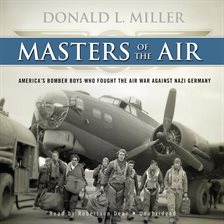
eAudiobook
hoopla Instant
Masters of the Air
Year
2012
Language
ENGLISH
Duration
25h 16m
Publication Information
Blackstone Publishing
Summary
This is the dramatic story of the American bomber boys in World War II who brought the war to Hitler's doorstep. With the narrative power of fiction, this is a harrowing ride through the fire-filled skies over Berlin, Hanover, and Dresden. Fighting at twenty-five thousand feet in thin, freezing air no warriors had encountered before, bomber crews battled new kinds of assaults on body and mind. Air combat was deadly but intermittent: periods of inactivity and anxiety were followed by short bursts of fire and fear. Unlike infantrymen, bomber boys slept on clean sheets, drank beer in local pubs, and danced to the music of Glenn Miller's Air Force Band. But they had a much greater chance of dying than ground soldiers. In 1943 an American bomber crewman stood only a one-in-five chance of surviving his tour of duty. The Eighth Air Force lost more men in the war than the US Marine Corps. The bomber crews were an elite group of warriors. Actor Jimmy Stewart was a bomber boy, as was “King of Hollywood” Clark Gable. The air war was filmed by Oscar-winning director William Wyler and covered by reporters like Andy Rooney and Walter Cronkite, all of whom flew combat missions with the men. The Anglo-American bombing campaign against Nazi Germany was the longest military campaign of World War II, a war within a war. Until Allied soldiers crossed into Germany in the final months of the war, it was the only battle fought inside the German homeland. Strategic bombing did not win the war, but the war could not have been won without it. American airpower destroyed the rail facilities and oil refineries that supplied the German war machine. The bombing campaign was a shared enterprise: The British bombed at night while American bombers attacked by day—a technique that British commanders thought was suicidal. Drawn from interviews, oral histories, and American, British, German, and other archives, this is an authoritative, deeply moving account of the world's first and only bomber war.